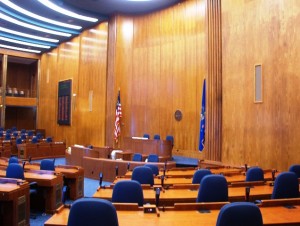Richland-Wilkin Joint Powers Authority
Original Publication Date:
November 29th, 2012
Wahpeton Daily News
Republished with permission from:
Author: Cash Aaland, director Mndak Upstream Coalition
We hold dear the rights enumerated by the founders, chief among them the rights to life, liberty and property. Our laws limit when and how our government, whether state, federal or municipal, may separate us from those rights. As residents, we are protected by both a state constitution and the federal constitution. They are not the same, and the protections are not equal. A state agency is limited by both the state and federal constitutions. A federal agency is bound only by federal law.
One example of the difference involves North Dakota’s law on entrapment. Some years ago, Fargo police set up a “reverse sting,” involving undercover agents selling previously seized cocaine. When the suspect left the hotel room after the purchase, he was arrested for felony drug possession. His state conviction was overturned by the North Dakota Supreme Court, which ruled as a matter of state law that “The methods employed by the State must measure up to commonly accepted standards of decency of conduct to which government must adhere. The manufacture or creation of a crime by law enforcement authorities cannot be tolerated.” State v. Kummer, 481 N.W.2d 437 (ND 1992). No similar protection exists under federal law. Following the dismissal in state court, federal prosecutors charged and convicted Kummer in federal court, which is not bound by North Dakota law.
Similarly, our property rights have greater protection under North Dakota’s Constitution. The state power of eminent domain, the power of the government to deprive persons of their real property, is limited by North Dakota’s Constitution. Our constitution provides that the government can only take private property for a “public use” or purpose. Article I, Section 16, of the North Dakota Constitution specifically provides that a public use or purpose “Does not include public benefits of economic development, including an increase in tax base, tax revenues, employment, or general economic health.” No such protection exists under federal eminent domain law. The lack of this protection under federal law is what prompted our state lawmakers to add this guarantee to our state constitution.
Imagine a city using the power of eminent domain to take a family farm against the owner’s wishes, only to turn it over to private developers to build an exclusive private golf course. This would be unconscionable under N.D. law, but perfectly acceptable under federal law. Likewise Fargo’s plan to dam the Red and Wild Rice rivers, flooding 50,000 acres, and “taking” the property of hundreds of citizens, is motivated and justified by Fargo’s future economic development of the natural flood plain by expanding south into Cass County. As such, it would be prohibited by North Dakota law. Cass County Commissioner Daryl Vanyo and U.S. Army Corps project manager Aaron Snyder are both on record stating that Fargo intends to have the Army Corps, a federal agency and Fargo’s contractor, employ federal eminent domain authority to take the property in federal court. Fargo’s leaders can thereby avoid the more stringent protections of North Dakota law and sidestep our state constitutional rights. We will ask our state legislators to consider this issue when Fargo submits its request for $550 million, and refuse to fund a plan that can only proceed by circumventing the rights guaranteed to their constituents by the North Dakota Constitution.
Views: 142

The FM diversion plan, FEIS July 2011, states the local agency is to acquire the property.
The local agency, the Diversion Authority, is the local agency who will “sign” the order to force you to give up your property to Fargo. But the local agency is not ready to have their name on the order to bulldoze you life’s work.
So we have the old game of blame someone else for the dirty deeds.
The old blame someone else for what you don’t want to do.
Thanks
TR